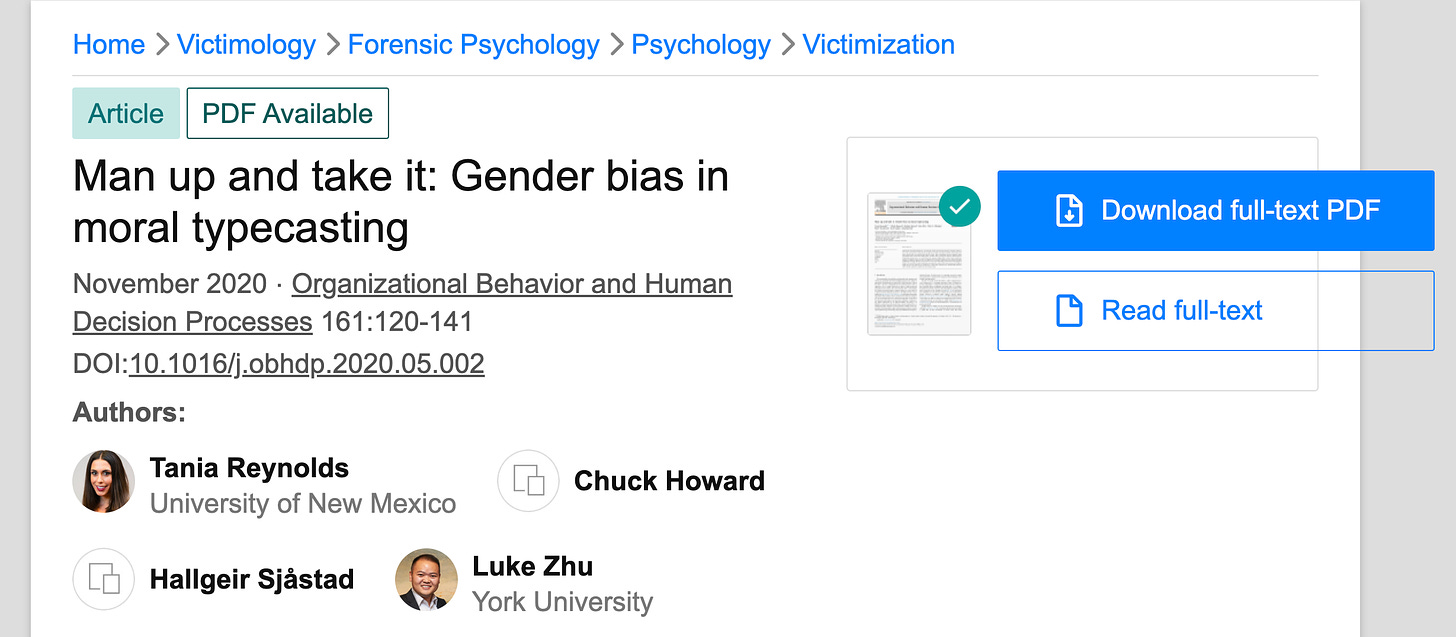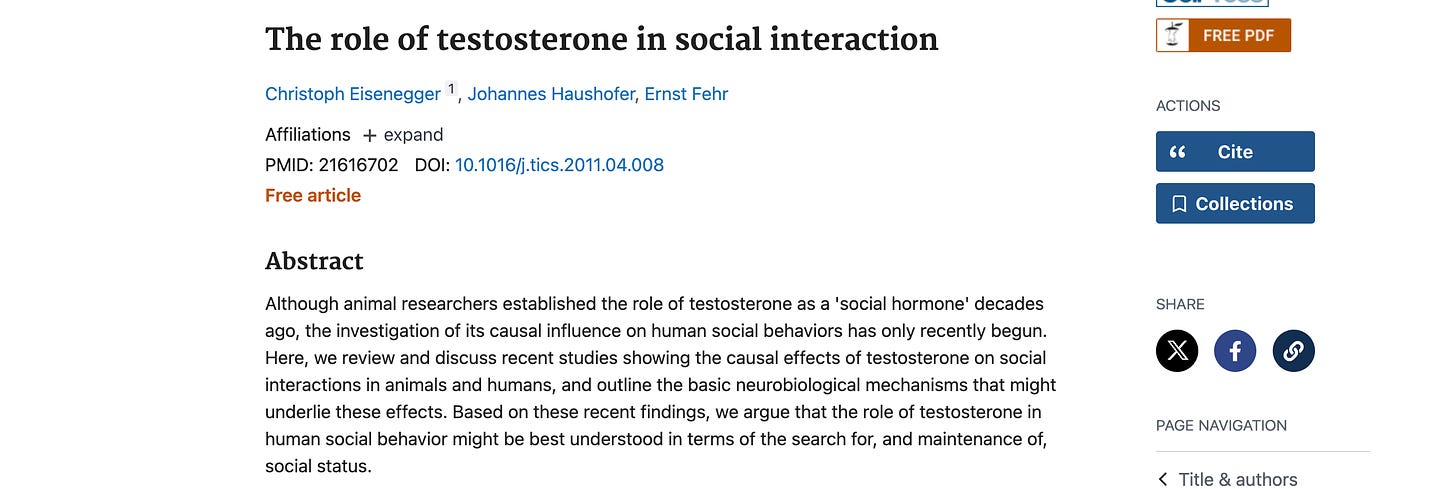
Why Men Don’t Fight Back: Key Insights from Research
The previous post explored a number of reasons why men often refrain from pushing back, focusing on the ideas of male hierarchy and gynocentrism. While these concepts are straightforward, academic research directly addressing them is scarce. However, over the past two decades, studies have inadvertently deepened our understanding of both. Research on Moral Typecasting highlights the reality of gynocentrism by illustrating the contrasting ways that men and women receive empathy and compassion. Meanwhile, studies on Precarious Manhood and testosterone's role in social behavior shed light on the male hierarchy and the constant social negotiations men navigate within it. Although these studies don’t directly address men’s reluctance to push back, they reveal patterns that support this behavior, painting a compelling picture of the social and biological factors that can make men less inclined to retaliate, both interpersonally and socially. Let's first look at moral typecasting.
Moral Typecasting

The concept of moral typecasting sheds light on why men often don’t fight back. In moral psychology, moral typecasting explains how people tend to categorize others into one of two roles in moral situations: moral agents (those who take action and demonstrate agency) and moral patients (those who receive action and embody patiency).
Research suggests that individuals are usually categorized as either “doers” (moral agents with agency) or “sufferers” (moral patients with patiency), and these roles are largely seen as mutually exclusive. Once someone is perceived as having agency, they’re viewed as less capable of suffering or as less deserving of compassion. Conversely, those seen as having patiency are regarded as victims who deserve empathy, are assumed to feel more pain, and are seen as worthy of support.
Recent research reveals that people are more inclined to automatically assign agency to men and patiency to women. As a result, most people tend to see men as having agency and women as having patiency.
The table below illustrates these general attitudes:
Agency (Men) Patiency (Women)
Seen as capable Seen as vulnerable
Receive less support Seen as victims
Viewed as blameworthy Viewed as needing support
Deemed deserving of punishment Deserving of compassion

This means that women are more likely to be seen as vulnerable and deserving of support. It also helps us to understand why many people will look for excuses for women even in the extreme case of when they are convicted of a crime. People will automatically offer excuses for her such as her past abuse or her mental health issues as reasons for her misbehavior. Men, on the other hand, are more likely to be viewed as having agency, meaning they are expected to be capable and self-sufficient, with less need for compassion. If a man is convicted of a crime, people are more likely to believe he deserves full punishment. These biases are unconscious and automatic; most people are unaware of them. This impacts a huge decrease in length of sentencing for the same crime. Research tells us that the bias is so strong that women get 62% less time in jail for the same crime. This is moral typecasting/gynocentrism at work. And no one notices.
These findings parallel the gynocentric model that predicts that women will receive more compassion and support simply for being women. We add onto that the moral typecasting findings that men by default will be less likely to get compassion and understanding. Men's pain and needs are more likely to be ignored.
How Moral Typecasting Affects Men's Reluctance to Fight Back
This bias influences men's reluctance to fight back. Both men and women in relationships are likely to perceive the woman as vulnerable and deserving of support (e.g., "never hit a girl"). At the same time, the man is seen as having agency, so he is expected to help and take responsibility and is much less deserving of support. This dynamic creates a silent, but powerful, impact on relationships, the belief that a man's role is to help and support the woman and to avoid voicing his own needs. (happy wife, happy life) Men are aware that people care much more about the difficulties of women and not about his difficulties, and tend to stay quiet. How does one fight back for something no one cares about? They don't. This is clearly marking the quiet and powerful workings of gynocentrism that creates a different world for men and for women.
If the man fails in some way, he is seen as deserving of punishment, while the woman’s failures are met with compassion and understanding. This sets men up to have their pain ignored. If people believe you are not entitled to an emotional response to hardship, that diminishes their interest in hearing your struggles, your wants, and your needs. And men live in a world that expects them to have agency, get the job done and not complain. Men are very aware that no one wants to hear their personal problems. Many men simply feel it is not worth it to complain. When no one wants to hear your struggles and difficulties it makes it senseless to complain about your struggles and difficulties. Attacking feminism would be just that. It would be seen as a complaint from a "privileged" man who has agency and would be viewed as being anti-woman. In some ways, relationships are a set up.
Emotional Impact of Agency and Patiency
Another critical aspect is how agency limits the expression of tender emotions. A person with agency (mostly men) is expected to get things done, not to show vulnerability or cry. In contrast, someone with patiency is expected to have emotions and is often rewarded for expressing them and being vulnerable. This dynamic encourages women in relationships to express emotions, while discouraging men from doing the same. Women are allowed emotional expression; men are not. At the same time men are expected to have agency and help her with her needs. So he is silenced and she is given permission to openly emote/complain and he is responsible to fix it. This not only directly impacts the amount of compassion each receives, it also creates a one way path where the man's needs are of less importance. This explains how when a man complains about feminism and how it negatively impacts him he is usually called a whiner. "Stop your whining! You have it all!"
It's easy now to see that men will be less likely to ask for help, complain about their situation, or even to point out a double standard. Why? Because people are by default, biased to care more about the needs of women and not as much about the needs of men. If he complains it puts him into a position of claiming vulnerability and need and this is exactly what moral typecasting tends to stifle. When she complains people listen, when he complains people will likely call him a baby and tell him he needs to man up. Just listen to women talk about their husbands when the husbands are ill. The women can only tolerate a man's neediness for a short period before she burns out and throws her hands up in the air saying that he is such a baby and needs to grow up. A man's dependency is very tough on women.
How does this show up in the real world? Have you ever told a feminist that men are also victims of domestic violence? The result is that you will likely be immediately attacked. It's easy to see how women's pain is an important topic but men's pain is avoided at all cost. I remember telling a feminist domestic violence worker that men were a considerable portion of the victims but had no services. Did she commiserate about the men who were left out? No, first she loudly denied it and next told me I was a misogynist, that I didn't really care about women. Then she finished up by saying "If there are male victims you need to build shelters for them just like we did for women." Note that she feels perfectly all right in taking credit for the building of services for women and is equally happy to hold me to be the accountable party to build new shelters for men. This of course relieves her of any responsibility for the problem. Pretty slick for someone who likely didn't lift a finger to build those shelters. Men built them, men funded them, men legislated for them. And so it goes. That is the nature of moral typecasting. It basically has a hand in shutting men up.
Precarious Manhood

Research on precarious manhood reveals that the experiences of manhood and womanhood are fundamentally different. For girls, reaching womanhood is tied to a biological event—menstruation—after which they are considered women. Psychologists refer to this as an ascribed status, meaning it is granted based on a biological milestone. In contrast, manhood is not an ascribed status. Even after puberty, boys are not automatically considered men. They have to prove it.
The research shows that, across many cultures worldwide, boys must prove their manhood through public actions or achievements. Even when a boy is accepted as a man by his culture, his status is fragile—he can lose it if he behaves in ways deemed unmanly. This is why it’s called "precarious manhood." The original researcher Joseph Vandello, describes manhood as "hard to gain but easy to lose." This experience is completely different from that of girls becoming women, as they do not have to prove anything to gain their status as women. This leaves boys and men sensitive to anything that might raise or lower their status. Males and females live in very different worlds but no one tells the boys that is the case.
A central aspect of precarious manhood, (and the male hierarchy) is the role women play in judging a man's masculinity. Men will also judge other men but this is the judgement of a competitor since men are in competition with each other. This makes women's judgement of men important. The sum of men's and women's judgements of men is typically for the purpose of ranking the man within the male hierarchy. This ranking is key in the man's ability to attract the top females. This positions women as crucial evaluators of a man's masculinity, making men hesitant to do anything that could diminish their status in women's eyes. Fighting back, for instance, could risk alienating those who judge their status. In a competition where there are judges, would you want to piss them off?? Of course not—you want to impress them. Would you want to tell them that feminists, who they believe support their female side of the equation are not telling the truth? How do you think that would go over? You would quickly be seen as a misogynist.
Can you see how precarious manhood prevents men from expressing vulnerabilities or anything that might jeopardize their status? Can you see that attacking feminism would likely not only fall on deaf ears but be viewed as anti-woman? Complaining about women/feminists would likely be a failing effort considering the dynamics of precarious manhood and moral typecasting.
Testosterone

Testosterone research has shown us that men's levels of Testosterone impact his desire to strive for status. This of course integrates with the precarious manhood and moral typecasting we have seen above. From the social side men are pushed by precarious manhood to strive for status and from the biological side testosterone also pushes men to strive in a similar manner. It's a squeeze play as men are pushed from both sides, social and biological. Testosterone also lowers men's fears and increases their willingness to take risks. Very few women understand these things and often will find themselves judging men unfairly since it differs from their own path and they have been taught the erroneous idea that men and women are all the same. Testosterone is yet another reason, in addition to precarious manhood and moral typecasting for men to use caution when complaining about or challenging women or feminists.
Whether it is moral typecasting, precarious manhood or the downplaying of the man's side of a relationship we see a common theme: the woman's needs and desires take precedence over the man's. This is rarely discussed or even acknowledged. My experience with couples therapists over the years was consistent. They tended to focus on what the woman wanted and needed and the man's needs and wants came in second place. The unwritten and unspoken rule seems to be that she comes first (ladies first) and he should be responsible to see that it happens. Things are further complicated by the tendency to ignore men's needs and emotional pain. He is seen by default as someone with agency and this negates the concerns for his side of things. He is expected to take care of things and not complain. When he does complain you see fireworks. I remember working in therapy with a family of a man who had just lost his multi-million dollar fortune. Were the children and wife compassionate towards his loss? Were they concerned about his emotional state. No. They were angry at him since his loss meant they were now having to downgrade their lifestyle. He was treated more like a spigot than a human being.
In light of all this, it becomes clearer why men often hesitate to challenge feminist narratives or advocate for their own needs. The research findings of moral typecasting, precarious manhood, and biological drivers like testosterone show a strong incentive for men to stay silent, to avoid challenging views that may compromise their perceived status or provoke social backlash. These dynamics not only perpetuate the expectation that men should “man up” and bear hardships without complaint but also contribute to a cultural framework where men’s voices and vulnerabilities are often minimized. Understanding these influences allows us to see the silent struggles men face in a society that expects strength, discourages vulnerability, and often places men’s needs on the back burner. And most people simply don't see it. Gynocentrism runs silent and it runs deep.
The next post in this series will focus on how feminists weaponized an already powerful gynocentrism to insure that men did not fight back.
Moral Typecasting
https://scholar.harvard.edu/files/dwegner/files/gray__wegner_2009_moral_typecasting.pdf
Tania Reynolds
https://www.researchgate.net/publication/342642686_Man_up_and_take_it_Gender_bias_in_moral_typecasting
Precarious Manhood - Vandello
https://www.apa.org/pubs/journals/features/men-a0029826.pdf
Bosson Research - Precarious Manhood in 62 nations around the world
https://www.researchgate.net/publication/349767070_Psychometric_Properties_and_Correlates_of_Precarious_Manhood_Beliefs_in_62_Nations
Testosterone
https://pubmed.ncbi.nlm.nih.gov/21616702/
Sentencing Research
The study: https://papers.ssrn.com/sol3/papers.cfm?abstract_id=2144002


















